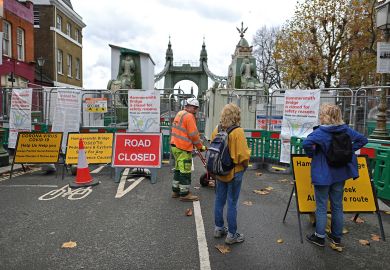Nearly three-quarters of voters would support using public money to help rescue UK universities in financial crisis, polling has indicated.
Eighty-one per cent of Labour supporters and 77 per cent of Conservatives said it was “important” or “very important” that the next government take action to support any university at risk of closure because of financial issues, “including providing emergency funding”.
Pollsters Savanta surveyed a nationally representative group of 2,000 people on behalf of the University and College Union (UCU), which said the results showed that more financial support for higher education was a “vote winner”.
The sector has been pushing for the next government to make money available to stave off the immediate risk of an institution going bankrupt after the English regulator, the Office for Students, warned that two in five universities expect to be in deficit this year.
Polling released by The Policy Institute at King’s College London earlier this month showed that seven in 10 voters would be concerned by widespread university closures.
Labour’s shadow education secretary, Bridget Phillipson, has said she does not feel bailouts would be necessary but has promised “day one” measures to stabilise the sector if her party wins power.
Speaking to the BBC’s Today programme on 27 June, Ms Phillipson did not commit to more spending on higher education, instead saying that “strong regulation” was needed to secure the long-term future of universities.
UCU’s general secretary, Jo Grady, said the polling “shows the British public wants the incoming government to step in and provide urgent financial support to any university at risk of going under”.
“If elected into office next week, the Labour Party has rightly said higher education will be a day one priority, but it also needs to realise that reckless market dogma has pushed universities to the brink and offer realistic solutions to the crisis,” she said.
UCU has released its own manifesto, which says tuition fees should be scrapped, with businesses asked to pay more towards the costs of the higher education system.
Dr Grady said that “to stave off collapse, higher education must be publicly funded; anything less would be a historic failure”.
With the general election now less than a week away, universities are continuing to attempt to demonstrate their worth to the next government, emphasising the role they can play in skills training and economic growth.
A report released by the Russell Group on 28 June emphasises the importance of institutions to their local communities beyond the immediate benefits of providing employment and study opportunities.
Research-intensive universities have helped to tackle local health inequalities as well as having provided access to arts and culture via free events and exhibitions, the report says.
“If the next government wants to follow through on promises of local growth and prosperity, it should look to the universities who are already there on the ground, re-energising communities and laying the foundations for success,” said Tim Bradshaw, chief executive of the Russell Group.
Register to continue
Why register?
- Registration is free and only takes a moment
- Once registered, you can read 3 articles a month
- Sign up for our newsletter
Subscribe
Or subscribe for unlimited access to:
- Unlimited access to news, views, insights & reviews
- Digital editions
- Digital access to THE’s university and college rankings analysis
Already registered or a current subscriber?








